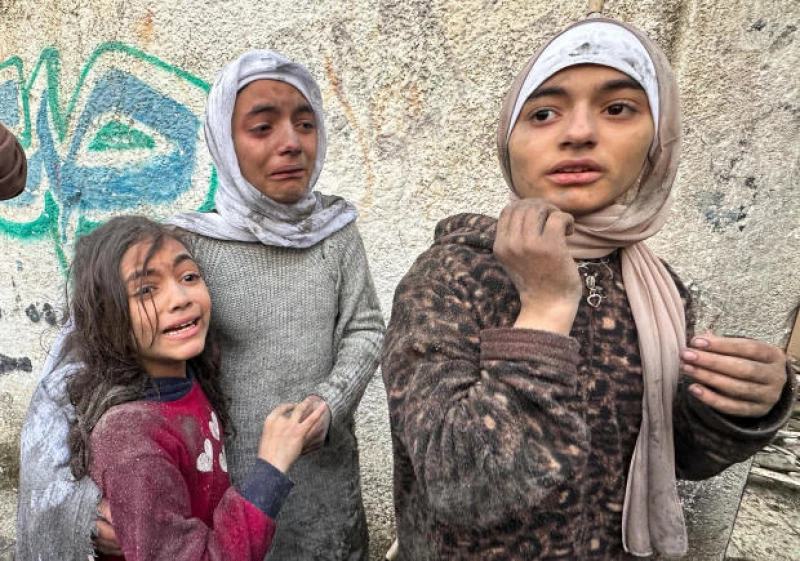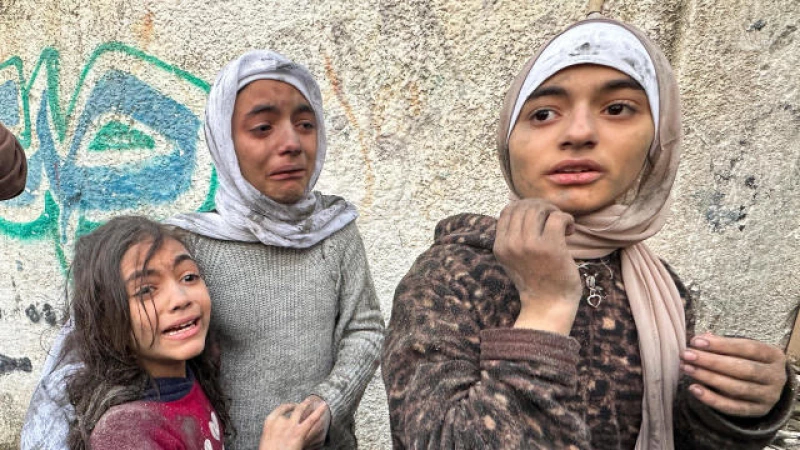The Israeli military continues relentless bombing of Gaza despite calls for a cease-fire
Despite increasing calls for a cease-fire and pressure from its closest ally, the United States, to prioritize human life, the Israeli military is determined to carry on with its mission of destroying the Palestinian militant group Hamas.
Israel claims that it is solely targeting terrorists and terror infrastructure, but the Gaza Strip's Hamas-run Health Ministry reports that the war has already claimed the lives of over 18,000 people. The conflict was ignited by Hamas' unprecedented attack on southern Israel on October 7, an organization that has long been labeled as a terrorist group by the U.S., Israel, and numerous other nations.
Hospital records obtained by the Associated Press reveal that an Israeli airstrike in the city of Rafah, located on Gaza's southern border with Egypt, killed at least 23 people overnight. It is worth noting that Israel had directed civilians in this area to seek shelter.

CBS News producer Marwan al-Ghoul narrowly escaped another strike in the vicinity. On Monday, he visited the site of a bombardment that claimed the lives of at least 10 people, a mere 500 yards away from his own home.
"These children are not Hamas"
The escalating number of casualties in Gaza has sparked growing outrage worldwide, but nowhere more intensely than in the Israeli-occupied West Bank, the other Palestinian territory.
In the city of Ramallah, protesters took to the streets on Monday, carrying a 40-foot banner displaying the names of Palestinians killed in Gaza. The banner read, "We are not numbers."
This message, written in English, was likely directed at the only nation many people in the region believe can exert influence over Israel's military.
"We oppose the stance of the United States of America when they vetoed twice against the Palestinian people," one man at the rally told CBS News.
The U.S. has prevented the adoption of legally binding United Nations security resolutions that would have called for a new ceasefire. Both Washington and Israel argue that any pause in the fighting would allow Hamas militants to regroup.
However, Palestinians and their supporters argue that those suffering the most under Israel's relentless offensive in Gaza are not terrorists.
"These individuals are not Hamas," stated Lubna Kharouf, a local city council official in the West Bank, as she pointed to Palestinians at the protest in Ramallah. "These children are not Hamas... and the people being targeted in Gaza are primarily women, civilians, and children — and they are not Hamas."
The United Nations' World Health Organization (WHO) expressed concern on Tuesday over the impact of Israeli checks and the detention of health workers in Gaza, stating that it is putting the lives of already fragile patients at risk.
During a briefing, Richard Peeperkorn, the WHO's representative in the Palestinian territories, stated that the health system in Gaza has significantly deteriorated in just 66 days. From having 36 functional hospitals, there are now only 11 partially functional hospitals, with one in the north and ten in the south.
Urgent need for humanitarian aid and prioritizing civilian life
Since October 7, one of the main factors contributing to the dire humanitarian circumstances in Gaza has been the military sealing of the territory's borders by Israel. Gaza heavily relies on daily supplies coming from Egypt and Israel, which include essential items such as medicine, food, and fuel. Currently, only the Rafah crossing on the border with Egypt has been reopened, but aid agencies report that the flow of supplies through it is insufficient to meet the needs of Gaza's 2.3 million people.
Israeli Authorities to Open Kerem Shalom Crossing with Added Security Screening
Hours after U.N. aid agency officials speaking with CBS News renewed their plea for Israel to open the Kerem Shalom crossing into Gaza on Monday, to increase the flow of aid into the besieged enclave, Israeli authorities indicated that the country's border checkpoint there would be opened, but to add "security screening" capacity, not for additional trucks to cross into Gaza.
It was not clear how much more aid the additional screening might enable or expedite, as the materials would still need to return to the Rafah crossing to enter Gaza.
U.S. State Department spokesperson Nathaniel Tek, meanwhile, echoed remarks made last week by Secretary of State Antony Blinken, telling BBC News on Tuesday that the Biden administration believes it's "critical that Israel places a premium on the protection of human life, and for the ability of aid organizations to access civilians."
"There certainly is more that can be done," Tek said, "and more precise and clear directions can be given to civilians to ensure they can reach safety. We believe that while Israel's intent is there to ensure the protection of civilians, the results also matter, and we are working and pressing the government of Israel to make sure they are putting a premium on civilian life."
He stressed that Hamas, which both Israel and the U.S. accuse of using Palestinians as human shields, also had a responsibility to protect civilians, and he added that the group had "not shown any interest or inclination to do so."
Amidst the ongoing conflict between Israel and Gaza, there are growing concerns that the violence could extend beyond the borders of Gaza. Both sides appear to be firmly entrenched, leaving little hope for an immediate cease-fire.
White House National Security Council spokesperson, John Kirby, expressed the United States' concern regarding reports that Israel may have utilized white phosphorus munitions, which were provided by the U.S., during strikes in southern Lebanon in October. These strikes targeted the Hezbollah militant group, which is based in the region.
Kirby stated, "We have seen the reports and we are certainly concerned about that," referencing an article published by the Washington Post.
He further added, "We will be seeking more information through inquiries. White phosphorus, although highly incendiary and challenging to extinguish, does have legitimate military uses such as illumination and concealing troop movements with smoke."
Kirby emphasized that when the U.S. provides items like white phosphorus to another military, it is done with the expectation that it will be used in accordance with legitimate purposes and in compliance with the laws of armed conflict.
Hezbollah, a powerful regional force that, like Hamas, is backed by Iran, has warned repeatedly that it would join Hamas in the war with Israel if called on to do so. Already Hezbollah militants in southern Lebanon have exchanged fire with Israeli troops across Israel's northern border.
Kirby stressed Monday that the White House does not want to see a second front open up in the war.
Houthis attack European oil tanker near Yemen
Yemen's Iran-backed Houthi rebel movement said Monday that it had attacked a Norwegian-flagged oil tanker off the country's coast, calling it the latest military operation carried out in protest of the Israeli bombing of Gaza.
The U.S. military's Central Command (CENTCOM) said an American warship, the USS Mason, "responded to the M/T STRINDA's mayday call" after what it said appeared to have been a strike with an anti-ship cruise missile. CENTCOM said the Strinda "reported damage causing a fire on-board, but no casualties at this time," and that the Mason had provided unspecified assistance.
The Houthis, a formidable fighting force that captured more than half of Yemen, igniting a civil war in 2014 that continues today, have fired a series of missiles and drones in the direction of U.S. military vessels and other ships in the region since the Israel-Hamas war began.
Scientists Discover New Species of Insect in Amazon Rainforest
A team of scientists from the Amazon Rainforest Research Institute has made an exciting discovery - a new species of insect that has never been seen before. The insect, named "Amazonus insectus," was found deep within the rainforest during a recent expedition.
The discovery of Amazonus insectus is significant because it adds to the growing list of unique species found in the Amazon Rainforest. This diverse ecosystem is home to countless plants and animals that are still being discovered and studied by scientists.
The team of scientists spent months exploring the rainforest, documenting and collecting samples of various insects. They came across Amazonus insectus when they noticed its distinctive markings and behavior. Further analysis in the lab confirmed that it was indeed a new species.
Dr. Maria Rodriguez, the lead scientist on the expedition, expressed her excitement about the discovery. "Finding a new species is always a thrilling experience, especially in such a biodiverse region like the Amazon Rainforest. It shows us just how much we still have to learn about the natural world," she said.
The discovery of Amazonus insectus highlights the importance of preserving the Amazon Rainforest and its unique biodiversity. As human activities continue to threaten this fragile ecosystem, it is crucial to protect and conserve it for future generations.
Scientists will continue to study Amazonus insectus and its habitat to learn more about its behavior, diet, and ecological role. The findings will contribute to our understanding of the rainforest's intricate web of life and may help guide conservation efforts.







